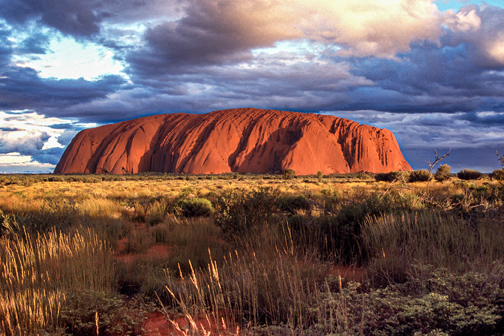
We can only pray that it starts to rain soon
N 22°30'04,3" E 145°55'04.5"
Day: 201 Stage three / total expedition days 592
Sunrise:
05:23
Sunset:
18:48
As the crow flies:
18,4
Daily kilometers:
23
Total kilometers:
6048 km
Temperature - Day (maximum):
43° degrees, sun approx. 65°
Temperature - Night:
27° degrees
Latitude:
22°30'04,3"
Longitude:
145°55'04.5"
Eastmere-Camp – 03.12.2002
It’s still just as damp at 3:00 in the morning. Everything is unpleasantly clammy. We have the feeling of being in a sauna. I look up at the sky in amazement, but there are no clouds to obscure the glow of the stars. “Strange weather,” I say quietly as I put the camp beds together. “Do you think it will rain?” Tanja asks. “I have no idea. Maybe it rained somewhere and we’re just getting the damp air?” I reply tiredly and sit down next to her in my chair to eat my muesli.
We are just loading the camels when they suddenly explode upwards like madmen. It takes a lot of effort to bring them under control until we recognize the cause of their behaviour. A man has parked his jeep about 50 meters behind our camp. He slowly approaches us. The camels are not used to such early visitors in the middle of the bush and probably think they see a ghost. “Hello, my name is Bob,” the man introduces himself in a friendly manner. “It took some time to find you. My wife and daughter were desperate yesterday when they didn’t find you after a two-hour search. They wanted to bring you water. Ashley from Fortuna called us and told us you were short of water,” he says. “Oh, too bad they didn’t find us. We had to cross this cleared forest to find this shady spot and something for our boys to eat. We hardly left a trace in this terrain,’ I reply.
In the course of the conversation it turns out that Bob is the manager of Eastmere Station. As we feel our strength waning again and don’t want to burn out completely, we make the last-minute decision to ask Bob if we can stay on Eastmere for a few days. “But with pleasure. You can rest with us for as long as you like,” he invites us.
ANTS IN THE DRINKING TUBE
Motivated to have an achievable goal in mind, we set off. The enormous humidity makes us sweat miserably. My shirt is slippery wet and sticks cold to my skin. Nevertheless, we don’t let it affect our mood. We stop for a quick drink every now and then. “Uuaaahh!” Tanja suddenly shouts and spits the water out again. “What’s wrong with you?” “Ants! Ahhh!” she shouts and spits again and again. My gaze falls to the floor. Sure enough, the spit-out spots are teeming with tiny ants. “They’ve bitten my throat and tongue,” says Tanja, breathing loudly and still spitting. “They must have crawled into the water bag at night,” she says and drinks a few big gulps to get rid of the unpleasant burning sensation in her throat. “Apparently they were in the drinking tube?” I ask questioningly. “Yes, but it’s fine now.” “Does it burn a lot?” I ask.” “It’s slowly subsiding.” Minutes later, our train of life starts moving again. We meet up with a few cars from the surrounding stations in the early hours of the morning. Our march is interrupted by fleeting, pleasant conversations.
We then reach the homestead relatively early. A green garden around the house shows us that someone has invested a lot of work here. Bob’s wife Marie and daughter Ann greet us at the fence. Without wasting much time, Marie shows me where our camels can find a place to stay for the rest days. As the fence is very low in some places and we are worried that Sebastian might climb over it, Bob suggests putting the animals in a cattle enclosure. “You can have a bale of hay. That will keep them full for a few days,” he generously offers. Because of the drought, hay is unaffordable here. Some farmers can no longer get any hay at all, as hay supplies have become very scarce throughout Australia. On the coast, a small bale costs between 15 and 25 dollars. The large bale that Bob offers us is equivalent to about 10 small bales of hay.
Anny drives the heavy, round bale to the enclosure with a tractor gate. I feed it to our boys straight away. Delighted at a change, they pounce on it.
DILAPIDATED ACCOMMODATION
Then we move into the dilapidated men’s quarters next to the homestead. The accommodation can be compared to an old barrack. A covered corridor enclosed by mosquito netting lies in front of four rooms. There is at least one old, rusty bedstead in every room. Worn mattresses rot around on the dusty wooden floor, through the cracks in the planks of which you can see the earth. There is a fan hanging from the ceiling which thankfully works. When I switch it on, it waves the hot air around. Right now I’m longing to go back to one of our bush camps. “I think we’d better sleep in front of the men’s quarters on our camp beds. We’ll feel much more comfortable there,’ I say.
In the evening we are invited to dinner. We talk about the route ahead and what happened on the farm. “If the drought continues, we don’t know how we’ll get through it,” Marie says and continues. “Some farmers have already killed themselves. If more waterholes and dams dry up, more kangaroos, birds and emus will die. It’s a bad time. We can only pray that it starts to rain soon.”

